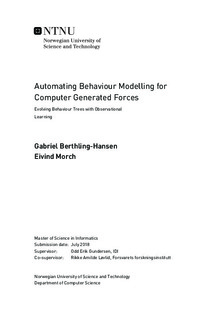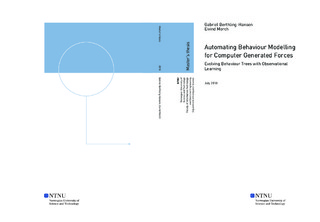| dc.description.abstract | Computer generated forces are simulated entities that are used in simulation based training and decision support in the military. The behaviour of these simulated entities should be as realistic as possible, so that the lessons learned while simulating are applicable in real situations. However, it is time consuming and difficult to build behaviour models manually, and there has been an increasing interest in automating this process using machine learning.
In this thesis, we investigate whether behaviour modelling for computer generated forces in complex, realistic simulation environments can be automated by using genetic programming to generate behaviour trees based on example behaviour. A system for evolving behaviour trees was implemented in order to evaluate the investigated method. The system is able to connect to a complex simulation system over high level architecture, and to use it for recording example behaviour and simulating behaviour trees. With the use of this system, we were able to generate behaviour trees that are close to identical to simple observed behaviour. The used example behaviour was recorded from a simulated entity which was controlled by a manually created behaviour tree. The results suggest that the investigated method works for modelling simple behaviour, but further work is required to evaluate how it performs with more complex behaviour.
The research presented in this thesis has three contributions: (i) proof that genetic programming and behaviour trees can be used to mimic recorded, simple behaviour in complex, realistic simulations; (ii) a proposed set of methods for mutating behaviour trees; and (iii) a modular system for using genetic programming to evolve behaviour trees through observational learning with a complex, realistic simulation system over high level architecture. | |

